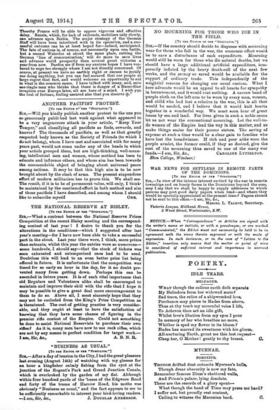NO MOURNING FOR THOSE WHO DIE IN THE FIELD.
[TO THE EDITOR OP THE "SPECTATOR."] SIR,—If the country should decide to dispense with mourning wear for those who fall in the war, the economic effect would be to save a disturbance of cash expendiWre. Mourning would still be worn for those who die natural deaths, but we should have a large additional artificial expenditure, tem- porarily inflated by the heavy death-roll of the next few weeks, and the money so saved would be available for the support of ordinary trade. This independently of the weightiei• reasons for changing our usual custom. What I here advocate would be an appeal to all hearts for sympathy in bereavement, and it would cost nothing. A narrow band of purple cloth on the left arm to be worn by every man, woman, and child who had lost a relative in the war, this is all that would be needed, and I believe that it would knit hearts together in a wonderful way. We must soon hear of great losses by sea and land. For lives given in such a noble cause let us not wear the conventional mourning. Let the well-to- do women of the Empire lead the way in this matter, and so make things easier for their poorer sisters. The saving of expense at such a time would be a clear gain to families who have lost the breadwinner. If rich and poor alike wore the purple armlet, the former could, if they so desired, give the cost of the mourning thus saved to one of the many war


































 Previous page
Previous page